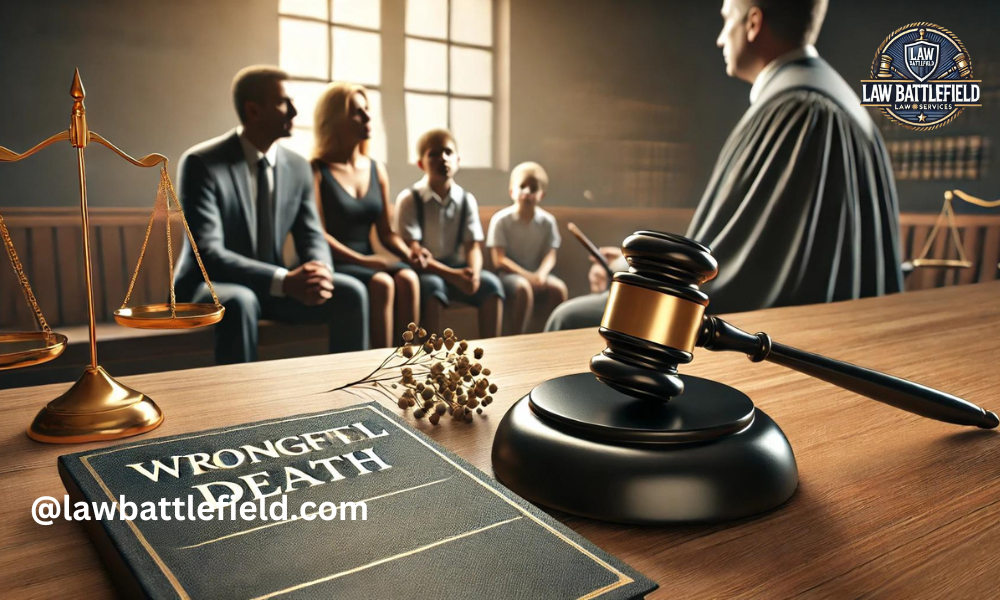Introduction To Wrongful Death Claims
Definition Of wrongful death
Wrongful death refers to a situation where someone’s life is taken due to the negligence, recklessness, or intentional actions of another person or entity. In simple terms, when a person dies because someone else acted carelessly or unlawfully, the surviving family members may have the right to file a wrongful death claim. This legal action helps the family seek compensation for their emotional and financial losses.
The Legal Significance Of A Wrongful Death Claim
A wrongful death claim is not just about blaming someone for the death of a loved one—it’s a way for families to recover from the financial impact of their loss. The legal system acknowledges that when a person dies unexpectedly, especially if the person provided for the family, the surviving relatives can face overwhelming costs, including medical bills, funeral expenses, and the loss of future income. A wrongful death claim helps hold the responsible party accountable and provides a way for families to recover damages. This claim also serves to prevent similar tragedies by ensuring individuals or companies are held responsible for their actions.
Common Causes Of Wrongful Death
Wrongful death cases can arise from various situations, but some of the most common causes include:
- Car accidents: Many wrongful death claims stem from car crashes caused by drunk driving, reckless driving, or distracted driving.
- Medical malpractice: A doctor or hospital can be liable if a patient dies due to improper treatment, surgical errors, or misdiagnosis.
- Workplace accidents: Unsafe working conditions, defective equipment, or a lack of proper safety measures can lead to fatal accidents in certain industries, especially construction or manufacturing.
- Defective products: Sometimes, a product malfunctions or is unsafe due to a design flaw or manufacturing error, resulting in fatal injuries to the user.
- Criminal acts: Intentional acts of violence, such as assaults or homicides, can lead to wrongful death claims in addition to criminal charges.
In a wrongful death lawsuit, a family can seek justice, closure, and financial compensation to cover the damages they’ve endured. Understanding the basic principles of wrongful death claims is the first step in navigating these complicated legal cases.
Who Can File A Wrongful Death Claim?
Eligible Family Members: Spouses, Children, And Parents
In most wrongful death cases, only certain family members are allowed to file a claim. The immediate family members who can typically file include:
- Spouses: The surviving spouse is usually the first person eligible to bring a wrongful death claim. They can seek compensation for the loss of companionship, emotional suffering, and the financial support that their partner provided.
- Children: If the deceased has children, they also have the right to file a claim. Both minor and adult children can file, especially if they relied on the parent for financial support or emotional guidance.
- Parents: In some cases, especially when the deceased person was unmarried or without children, the surviving parents may be eligible to file a wrongful death claim. This is especially common when a young adult dies unexpectedly.
The laws are designed to allow the closest family members to seek justice and compensation for the losses they’ve experienced due to the wrongful death of their loved one.
The Role Of The Estate Representative
If the deceased has no immediate family members (spouse, children, or parents), or if the family prefers, the estate representative can file the claim. This person acts on behalf of the deceased’s estate and manages the legal process. The estate representative could be named in the deceased’s will, or appointed by the court if no representative was specified.
Once a claim is filed by the estate, any awarded damages might go to the estate itself and be distributed according to the deceased’s will or local inheritance laws. This is common in cases where the death significantly affects the financial well-being of the estate and its beneficiaries.
Varying Rules By State
The rules regarding who can file a wrongful death claim vary from state to state. In some states, extended family members like siblings or grandparents may be able to file if there are no closer relatives. Other states may restrict claims to only immediate family members or estate representatives.
Additionally, the rules on how damages are distributed can differ between states. Some states allocate damages to the estate, while others divide the damages directly among the eligible family members. It’s essential to consult with a wrongful death attorney familiar with the laws in the specific state where the claim will be filed, as these variations can impact the outcome of the case.
The Role Of Wrongful Death Attorneys
Why Hiring A Wrongful Death Attorney Is Crucial
Hiring a wrongful death attorney is essential for families seeking justice after losing a loved one. Wrongful death cases are legally complex, requiring knowledge of state-specific laws, court procedures, and legal strategies to prove negligence and win compensation. Without an attorney, navigating these cases can be overwhelming for grieving families. An experienced wrongful death attorney not only helps with the legal process but also provides emotional support, guiding families through each step while they cope with their loss.
What Wrongful Death Attorneys Do:
A wrongful death attorney plays a crucial role in gathering the necessary evidence to support the claim. This includes collecting police reports, medical records, witness statements, and any other documents that show the responsible party’s negligence. Once the evidence is compiled, the attorney will file the wrongful death claim on behalf of the family or the estate.
Attorneys also handle negotiations with insurance companies or defense attorneys to seek a fair settlement. If an out-of-court settlement cannot be reached, the attorney will prepare to take the case to trial. In both situations, the attorney ensures that the family’s rights are protected and works to secure the best possible outcome, whether through settlement or a court judgment.
Navigating The Complexities Of The Legal Process
The legal process for wrongful death claims can be challenging to understand, especially for those unfamiliar with the law. Attorneys help families navigate these complexities by explaining each step, ensuring all documents are filed within the correct deadlines, and avoiding any mistakes that could jeopardize the case. They also guide families through the emotional challenges of a trial, providing support and expert advice on what to expect. Their expertise can make a significant difference in the speed and success of a wrongful death claim.
Key Elements Of A Wrongful Death Lawsuit
Duty Of Care
In a wrongful death lawsuit, the first element that must be established is duty of care. This means proving that the defendant (the party being sued) had a responsibility to act in a way that would not cause harm to the deceased. For example, a doctor has a duty to provide appropriate medical care to a patient, and a driver has a duty to follow traffic laws to prevent accidents.
Breach Of Duty
Once the duty of care is established, it must be shown that the defendant breached this duty. A breach occurs when the defendant acts negligently or recklessly, failing to meet the standard of care required. For example, a driver texting while driving and causing an accident is considered a breach of duty, as they neglected their responsibility to drive safely.
Causation And Damages
After proving the breach of duty, the next step is establishing causation. This means showing that the defendant’s actions directly caused the death. The connection between the breach of duty and the death must be clear. For example, if a doctor fails to diagnose a condition that leads to the patient’s death, the family must prove that the failure to diagnose caused the death.
Once causation is proven, damages must be quantified. Damages refer to the financial and emotional losses the family suffers due to the wrongful death, such as funeral expenses, medical bills, lost income, and emotional pain and suffering.
Proving Negligence And Liability
Proving negligence is often the most challenging part of a wrongful death lawsuit. The family, with the help of their attorney, must gather and present solid evidence to show that the defendant’s actions were negligent and directly caused the death. In some cases, expert witnesses, such as medical professionals or accident reconstruction specialists, are brought in to provide testimony that strengthens the case.
Wrongful death attorneys are skilled at proving liability by piecing together all the necessary elements—duty, breach, causation, and damages—giving the family the best chance of success in their claim.
Types Of Damages In Wrongful Death Claims
Economic Damages: Medical Bills, Funeral Expenses, Lost Wages, And Inheritance
Economic damages in a wrongful death claim refer to the measurable financial losses the family suffers due to their loved one’s death. These can include:
- Medical bills: Any medical expenses incurred before the loved one passed away. This could involve hospital stays, surgeries, medication, or emergency services.
- Funeral expenses: The costs related to the burial or cremation, including the funeral service, casket, and memorial services.
- Lost wages and benefits: If the deceased was a breadwinner, the family may recover the income that would have been earned if the individual had lived. This includes salary, bonuses, health insurance, and retirement benefits.
- Inheritance loss: If the death results in a loss of future inheritance for the survivors, this can be factored into economic damages.
These damages are easier to calculate because they are based on tangible financial costs and documentation, but they still require careful attention to detail.
Non-Economic Damages: Emotional Distress, Pain And Suffering, Loss Of Companionship
Non-economic damages are more challenging to quantify because they refer to the emotional and psychological losses suffered by the family. These include:
- Emotional distress: The mental suffering, anxiety, depression, or trauma caused by losing a loved one unexpectedly.
- Pain and suffering: The physical or emotional pain the deceased might have experienced before their passing, which can sometimes be included in a wrongful death claim.
- Loss of companionship: The loss of the relationship and emotional bond the surviving family members had with the deceased. This could include the loss of a spouse’s love, a parent’s guidance, or a child’s companionship.
Since these damages are subjective, an experienced wrongful death attorney can help families present a strong case for fair compensation, ensuring these emotional impacts are considered in the settlement or trial.
The Importance Of Calculating Damages Accurately
Calculating damages in a wrongful death case is critical. Accurate calculations help ensure that the family receives full compensation for their losses, both financial and emotional. Attorneys work with experts like economists and medical professionals to determine the total value of the claim. This often includes reviewing the deceased’s earning potential, the cost of future care for dependents, and the non-financial impact of the loss on the family’s quality of life. Proper calculation of damages is essential for negotiating settlements or presenting a convincing case in court.
How Wrongful Death Attorneys Help In Settlement Negotiations
The Role Of Attorneys In Negotiating Settlements
Attorneys play a vital role in negotiating wrongful death settlements. Their job is to present the strongest case possible to secure the maximum compensation for their clients. They do this by gathering all the necessary evidence, calculating damages, and leveraging their legal expertise. Attorneys are skilled in negotiating with insurance companies, who often try to settle cases for less than they are worth. By representing the family, the attorney ensures that the family’s best interests are protected and that they receive the compensation they deserve without being taken advantage of.
Mediation And Alternative Dispute Resolution Methods
In many cases, wrongful death attorneys may recommend mediation or other alternative dispute resolution (ADR) methods to resolve the case outside of court. Mediation allows both parties to come together with a neutral mediator to discuss the case and work toward a settlement. This process is often quicker and less stressful than going to trial. Attorneys help guide their clients through mediation, making sure they understand the options and making the strongest case for fair compensation.
Why Cases May Go To Trial If A Settlement Is Not Reached
Not all wrongful death cases settle through negotiation or mediation. If the responsible party refuses to offer a fair settlement or denies liability, the case may go to trial. When this happens, the attorney will represent the family in court, presenting evidence, calling witnesses, and arguing the case before a judge or jury. Going to trial can be more time-consuming and emotionally challenging, but sometimes it is necessary to ensure that justice is served and the family receives the compensation they deserve. A skilled wrongful death attorney will prepare the family for trial and guide them through the process with care and expertise.
Common Challenges In Wrongful Death Lawsuits
Legal Complexity And High Emotional Stakes
Wrongful death lawsuits are often legally complex and emotionally charged. The family is usually coping with grief while navigating a complicated legal system. These cases involve understanding various legal principles, including proving negligence, calculating damages, and following court procedures. For the family, reliving the details of their loved one’s death in legal proceedings can be emotionally draining. This makes it essential to have an experienced wrongful death attorney who can handle the legal complexities, allowing the family to focus on healing while their rights are protected.
Statute Of Limitations And Why Timing Matters
One of the most critical challenges in wrongful death lawsuits is the statute of limitations—the deadline by which a claim must be filed. Each state has different time limits, which can range from one to several years. Missing this deadline typically results in the case being dismissed, meaning the family loses the opportunity to pursue compensation. It’s important for families to consult an attorney as soon as possible after the death to ensure that their case is filed within the appropriate time frame. Timing is crucial, as delays can also impact the availability of evidence and witnesses.
Proving Negligence And Overcoming Defenses
Another challenge in wrongful death lawsuits is proving negligence. The burden of proof lies on the family to show that the defendant’s actions directly caused the death. This can involve gathering extensive evidence such as medical records, accident reports, and expert testimony. Defendants may also present strong defenses, such as arguing that the deceased was partially responsible for the accident. Overcoming these defenses requires a solid legal strategy and the ability to counter opposing arguments effectively. This is why having a wrongful death attorney skilled in building a compelling case is essential for success.
Understanding The Statute Of Limitations For Wrongful Death
State-By-State Variations In Deadlines For Filing
The statute of limitations for wrongful death claims varies by state, and understanding these variations is crucial. Some states have shorter deadlines, like one or two years, while others may allow up to five years or more. For example, in California, the statute of limitations for wrongful death is typically two years, while in Florida, families have up to four years. These deadlines can change based on the specifics of the case, such as if the death involved government entities, which often have shorter filing periods. This makes it important to check the specific laws in the state where the wrongful death occurred.
How Missing The Deadline Affects Your Case
If a wrongful death claim is filed after the statute of limitations has expired, the case is usually dismissed without the opportunity to be heard in court. This can result in the family losing their right to seek any form of compensation. It’s critical for families to act quickly, not only to meet the deadline but also to preserve important evidence. Missing the filing deadline can have devastating financial consequences, leaving families unable to recover damages for medical bills, funeral expenses, and the loss of future income. Therefore, consulting with an attorney early on ensures that the claim is filed on time and gives the family the best chance at receiving compensation.
What To Look For In A Wrongful Death Attorney
Experience In Handling Wrongful Death Cases
One of the most important factors to consider when hiring a wrongful death attorney is their experience. Not all personal injury attorneys have the necessary expertise to handle the complexities of wrongful death cases. You’ll want an attorney who has successfully managed wrongful death lawsuits and understands the specific challenges involved. Their experience can make a significant difference in gathering evidence, proving liability, and negotiating a fair settlement. Look for attorneys who have a proven track record in similar cases and understand the nuances of wrongful death laws in your state.
Compassionate Communication And Emotional Support
A good wrongful death attorney should not only be knowledgeable but also compassionate. Losing a loved one is emotionally draining, and the legal process can add to the stress. An attorney who communicates with sensitivity and empathy is crucial. They should be able to explain the legal process in a way that’s easy to understand and provide emotional support throughout the case. This includes keeping you informed, answering your questions, and showing genuine concern for your emotional well-being during such a difficult time.
Understanding Of Local Laws And Courtroom Strategies
Each state has its own set of rules and regulations regarding wrongful death claims, so it’s important to choose an attorney who is well-versed in local laws. They should understand the state’s statute of limitations, liability laws, and courtroom procedures. Additionally, your attorney should have strong courtroom strategies and be prepared to take the case to trial if necessary. While many wrongful death cases are settled outside of court, having an attorney who is a skilled litigator ensures you’re fully represented if a trial becomes necessary.
How To Prepare For A Wrongful Death Consultation
Gathering Documentation: Medical Records, Police Reports, And Witness Statements
Before your initial consultation with a wrongful death attorney, it’s helpful to gather all relevant documentation. This includes:
- Medical records: Any documentation showing the treatment your loved one received before their death.
- Police reports: If the death was related to an accident or criminal act, obtaining official reports is crucial.
- Witness statements: Collecting any statements or contact information from witnesses who can support your case. Having these documents ready allows the attorney to assess the strength of your case and provide you with informed advice during your consultation.
Questions To Ask Your Attorney During The Initial Meeting
During your first meeting with a wrongful death attorney, it’s important to ask questions that will help you understand their approach and expertise. Some useful questions include:
- How many wrongful death cases have you handled, and what were the outcomes?
- What challenges do you see in my case, and how do you plan to address them?
- How long do you expect the process to take?
- Will you handle my case personally, or will other team members be involved?
- How will you keep me informed about the progress of the case?
These questions can help you evaluate the attorney’s experience, communication style, and whether they are the right fit for your needs.
Understanding The Fee Structure: Contingency Fees Vs. Hourly Rates
Most wrongful death attorneys work on a contingency fee basis, meaning they only get paid if you win the case. This is a significant advantage for families who might be struggling financially after the loss of a loved one. Be sure to clarify the percentage the attorney will take from the settlement or court award, and ask about any additional costs such as court fees or expert witness fees. Understanding the fee structure upfront will help avoid surprises later in the process. Some attorneys may charge hourly rates, but this is less common in wrongful death cases.
Conclusion
The Importance Of Seeking Legal Help In Wrongful Death Cases
Losing a loved one due to someone else’s negligence is a painful experience, and pursuing a wrongful death claim can be overwhelming. Seeking the help of a wrongful death attorney is crucial to ensure that your family’s rights are protected and that you receive the compensation you deserve. These legal professionals have the expertise to handle the complexities of the case, allowing you to focus on grieving and healing.
How Wrongful Death Attorneys Support Families Through The Legal And Emotional Challenges
Wrongful death attorneys provide more than just legal representation; they also offer much-needed emotional support during a difficult time. From gathering evidence to negotiating settlements, they take on the legal burden, guiding families through each step of the process with care and compassion. Their role is to not only fight for justice but to help families cope with the emotional and financial challenges that come with losing a loved one.
Final Tips For Choosing The Right Attorney For Your Case
When choosing a wrongful death attorney, consider their experience, communication style, and knowledge of local laws. Look for someone who is both a skilled legal professional and an empathetic advisor. Ask the right questions during your consultation, and make sure you understand their fee structure. Taking the time to find the right attorney will give you peace of mind and improve your chances of a successful outcome in your wrongful death claim.
FAQs
What Qualifies As A Wrongful Death?
A wrongful death occurs when someone dies due to another person’s negligence or intentional actions. Common causes include car accidents, medical malpractice, and workplace accidents.
Who Can File A Wrongful Death Claim?
Typically, immediate family members like spouses, children, and parents can file a wrongful death claim. In some cases, the estate’s representative may file on behalf of the family.
How Long Do I Have To File A Wrongful Death Claim?
The statute of limitations for wrongful death claims varies by state, but it’s usually between one to four years. It’s important to consult an attorney as soon as possible to ensure your claim is filed on time.
What Types Of Damages Can Be Recovered In A Wrongful Death Case?
Damages can include economic losses like medical bills and lost income, as well as non-economic damages such as emotional distress, loss of companionship, and pain and suffering.
Do I Need A Wrongful Death Attorney?
Yes, wrongful death cases are complex, and an experienced attorney can help navigate legal procedures, gather evidence, negotiate settlements, and represent you in court if necessary.
How Much Does A Wrongful Death Attorney Charge?
Most wrongful death attorneys work on a contingency fee basis, meaning they only get paid if you win the case. The fee is usually a percentage of the settlement or award. Always discuss fees upfront during your consultation.
Was this article helpful? Check out more on Lawbattlefield.com
Miramar Mesothelioma Lawyer Vimeo: Finding Legal Support Through Online Resources





